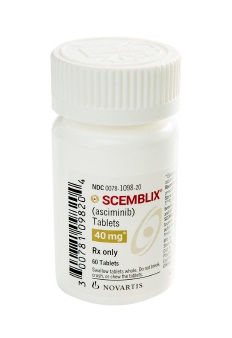Novartis' Scemblix (asciminib) will receive reimbursement for the third-line or more treatment of chronic myeloid leukemia patients in Korea starting next month.

The Health Insurance Review and Assessment Service (HIRA) said Thursday that it has revised and published details on the criteria and methodology for medical benefits for drugs prescribed and administered to cancer patients.
Scemblix was developed as a fourth-generation tyrosine kinase inhibitor (TKI) and won approval from the Ministry of Food and Drug Safety on June 9, 2022, to treat adults with Philadelphia chromosome-positive chronic myeloid leukemia (Ph+ CP-CML) in the chronic phase and were treated with two or more TKIs.
HIRA’s latest announcement indicated Scemblix succeeded in putting its name on the reimbursement list one year after receiving approval.
Scemblix's reimbursement criteria are the same as the ministry approved.
Scemblix demonstrated improved molecular and cytogenetic response rates (MMR and CCyR) compared to second-generation TKI bosutinib (Bosulif) in the phase 3 ASCEMBL study in patients aged 18 and older with chronic phase chronic myeloid leukemia.
In the study, the molecular response rate (MMR) at week 24 was 25.5 percent and 13.2 percent for Scemblix and Bosulif, and the cytogenetic response rate (CCyR) at week 24 was 40.8 percent vs. 24.2 percent.
Scemblix also demonstrated clinical utility in the MAIC study that indirectly compared it to ponatinib (Iclusig), a third-generation TKI. In this study, MMR at 24 months was 34 percent vs. 23 percent for Semblix and Iclusig, and CCyR at 12 months was 42 percent vs. 43 percent.
Based on these studies, current textbooks and NCCN guidelines recommend Scemblix as category 2A to treat chronic phase CML in patients resistant or intolerant to two or more prior TKIs.
However, insurance coverage for Scemblix in Korea is limited to patients without the “T315I” or “V299L” mutations. It is also based on selection criteria from the clinical literature.
The T315I and V299L mutations are the most common forms of BCR-ABL kinase domain mutations, which are known to cause resistance to TKIs.
Patients who are resistant to TKIs are more likely to fail in treatment. In this case, high-dose ponatinib is currently the preferred treatment, which explains why it was excluded from Scemblix's reimbursement criteria.
Besides, the reimbursement of Scemblix is likely to contribute to the long-term survival of chronic myeloid leukemia patients in Korea and reduce medical costs. That’s because the current treatment paradigm for chronic myeloid leukemia is moving towards the goal of eventually discontinuing drugs.
“The average age of the onset of chronic myeloid leukemia in Korea is about 49-50 years old, about 10 years earlier than in the West," said Dr. Kim Dong-wook, a world-renowned expert in the treatment of chronic myeloid leukemia and a member of the clinical trial team that developed Scemblix. He is a professor at the Hematologic Tumore Medicine Department of Uijeongbu Eulji Medical Center. “The younger age of onset means that patients have to take medication for longer, which burdens the government's health insurance finances."
However, Kim went on to say, from a health insurance perspective, it may be beneficial to provide early access to highly effective drugs such as Scemblix.
“By shortening the duration of treatment, it can increase the number of patients who can discontinue the drug early and reduce side effects, thus reducing additional ancillary costs," Kim added.

